Buckland voters OK grant match for historic properties survey
| Published: 05-05-2025 2:04 PM |
BUCKLAND — After lengthy discussion, a tied vote and a recount, voters approved appropriating $12,500 for a Historical Commission grant match to update records of historical sites in town.
In just over three hours, the 84 attendees of Saturday’s Annual Town Meeting approved all 26 articles on the warrant, including the $5.9 million operating budget for fiscal year 2026, moving Annual Town Meeting from a weekend to a weekday, and the funding for the Historical Commission.
“We were awarded a $12,500 grant. That being said, the town needs to have $12,500 to match it. The grant is a survey and planning grant to document historic sites in Buckland for the statewide database,” Historical Commission member Mike McCusker said. “A lot of this work was done back in the ’70s, and it was all done by volunteers and it was hand-scratched. It’s nowhere near to meeting muster any longer.”
The proposal, outlined in Article 19, sparked lengthy discussion, with residents questioning how the survey would work, how sites would be selected, if private property owners could opt out of having their homes examined for the study and why the project was necessary.
“Who determines the criteria of historical significance, and my question is rather significant because it’s not everybody’s history that gets deemed significant in this country,” resident Cheryl Dukes asked.
McCusker said the survey would not be able to cover every single site of historical significance in town, as there are more than 200 that have already been identified, including homes, churches, schools and town buildings, but the grant would allow the commission to hire a consultant who can help them identify sites and complete the work per Massachusetts Historical Commission guidelines. He added that public hearings would be held and outreach would be conducted to allow residents to voice their thoughts on what sites they believe are significant.
“We think of history as really about the past, but history is very much about the future in the sense that a project like this will enable and empower people in the future, including people living in this town, but also all over the country and all over the world to know about the history of this town,” commented Michael Hoberman, who co-chairs the Planning Board. “We are living in a climate right now where history is being gutted. … We have $12,500 being offered to us; if we say no to that, we won’t have another chance.”
Residents also questioned why they should support the petition article given the Finance Committee and Selectboard had voted not to recommend it, and asked if instead of using town funds, the Historical Commission could seek donations. Selectboard members said they felt it was a worthy cause, but it was a tight budget year, and approving the request meant they would need to reduce the amount put into the town’s stabilization accounts for emergencies and future financial planning.
Article continues after...
Yesterday's Most Read Articles
 ‘A whole lot of fun’ on the water: Christmas in July boat parade returns Saturday
‘A whole lot of fun’ on the water: Christmas in July boat parade returns Saturday
 New role focused on downtown development in Northfield, Turners Falls and Shelburne Falls
New role focused on downtown development in Northfield, Turners Falls and Shelburne Falls
 Several area departments put out Northfield house fire
Several area departments put out Northfield house fire
 Erving man, 60, found dead in Montague Plains Wildlife Management Area identified
Erving man, 60, found dead in Montague Plains Wildlife Management Area identified
 Firefighters partner with Jumptown to practice water rescues in Orange
Firefighters partner with Jumptown to practice water rescues in Orange
 Trio unopposed for Greenfield City Council seats
Trio unopposed for Greenfield City Council seats
Historical Commission member Beth Bascom said the state commission does require the grant match come from town funds.
Moderator Phoebe Walker put the motion to a vote and, after a hand count, announced there was a tie. Walker allowed a few more residents to comment on Article 19, then called for another vote, which resulted in it narrowly passing by a vote of 39-34.
With Article 19 passing, town officials had to quickly do some math for the next article that involved transferring free cash to the various stabilization funds. Originally, the town had proposed appropriating $113,234 to the stabilization funds. After subtracting the $12,500 grant match, that sum was amended to $100,734.
Voters also approved a $5.9 million operating budget, which included $2.39 million in expenses for public works, public safety, general government, etc., and nearly $3.33 million in educational assessments to the Mohawk Trail Regional School District, Smith Vocational and Agricultural High School, and Franklin County Technical School.
Discussion on the budget was brief, with residents asking about how costs for shared services such as policing are planned and paid for, why the police budget included a larger increase than other departments (19.1%), and if the Mohawk Trail budget included any cuts to administration given a decline in enrollment over the past few decades.
Finance Committee member and Police Services Advisory Committee representative Bob Dean said the town of Shelburne felt the department’s officers were underpaid and hired a consultant to conduct a salary study that analyzed the pay scales at other similarly sized departments across the state. The $71,000 increase to the police budget will allow the department to bring its staff up to a more comparable pay rate and remain competitive with other nearby departments.
For fiscal year 2026, the Police Department also requested $40,000 to cover Buckland’s share of a new cruiser and to replace bulletproof vests. The stabilization account had $30,000 set aside, so the town was asking for $10,000 to be appropriated from free cash to cover the difference.
Dean noted there is an open seat on the advisory committee, and anyone who is interested in serving and helping to guide the Police Department’s operations and budget can contact the Selectboard.
Regarding the school budget, Mohawk Trail School Committee Chair Martha Thurber said even with declining enrollment, school administrators are still needed, but if voters agree with a proposed plan to centralize all the district’s students and staff at one regional campus, the district will be able to create more cost-saving efficiencies.
“One of the major issues with small rural districts is that they are extremely inefficient. If you have a rural district with 1,000 kids, you still need a superintendent, you still need a business manager, you still need a special education director,” Thurber said. “That’s why we are proposing, and we would like our communities to consider, bringing all the kids into one place so that you are maximizing the efficiencies that we can get.”
Other articles that were approved included:
■Amending the town’s single-use plastic bylaw to remove an exemption for public schools and certain nonprofits. The article was passed with an amendment presented by the Board of Health, which put the changes into effect beginning in the fall of 2026, to allow the school district time to purchase reusable silverware.
■Amending the bylaws so Annual Town Meeting will be held on the first Tuesday evening of May, rather than the first Saturday.
■Amending the zoning bylaws on accessory dwelling units (ADUs) to be consistent with the state law that went into effect in February. The bylaw now allows property owners to build ADUs up to 900 square feet in any zoning district by right, and they may seek a special permit for an additional ADU. The article was passed with an amendment removing language that stated ADUs can only be constructed on owner-occupied properties, as the new state law bars towns from requiring owner occupancy for ADUs.
Reach Madison Schofield at 413-930-4579 or mschofield@recorder.com.

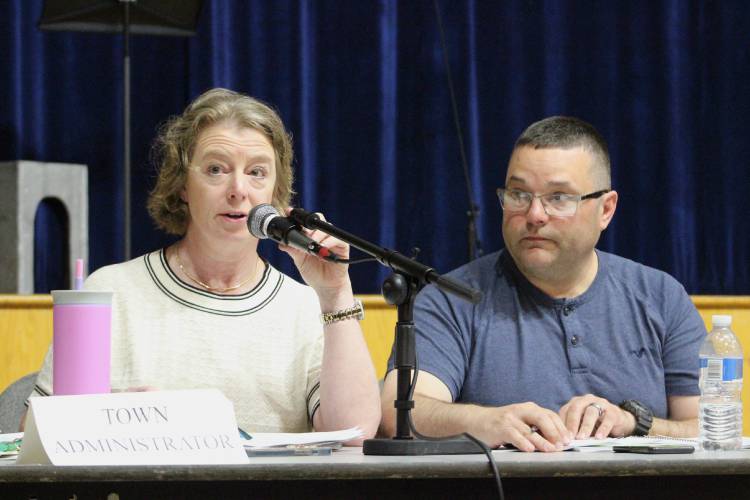
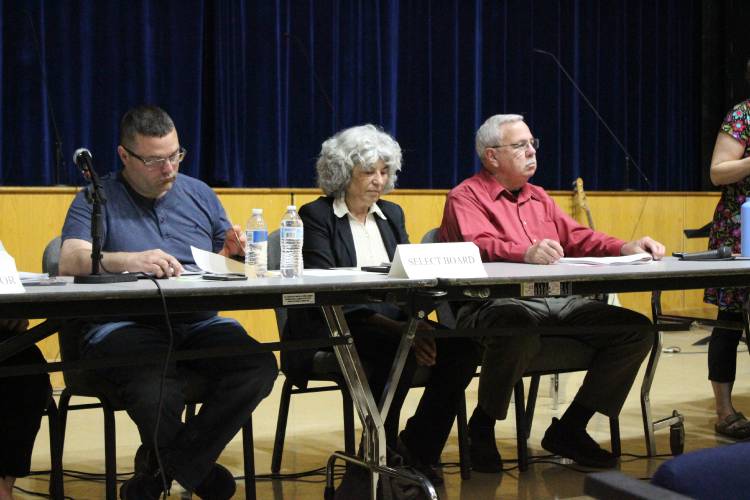
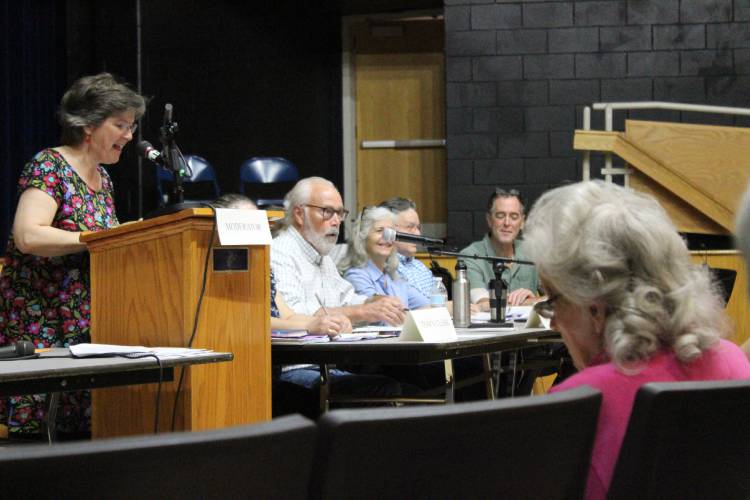
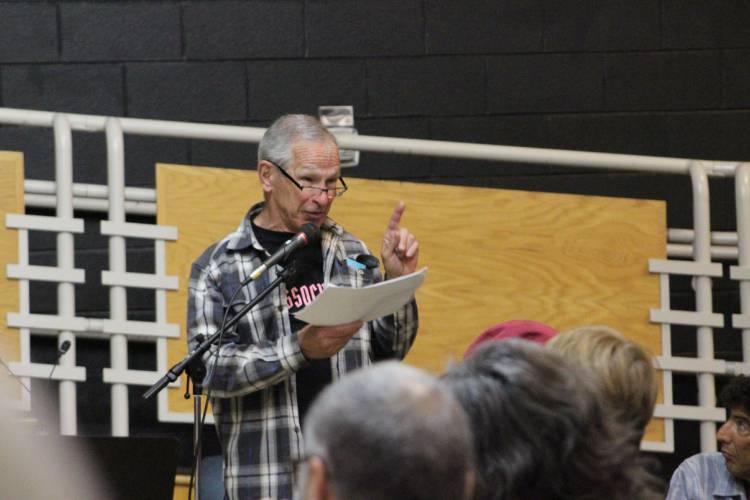
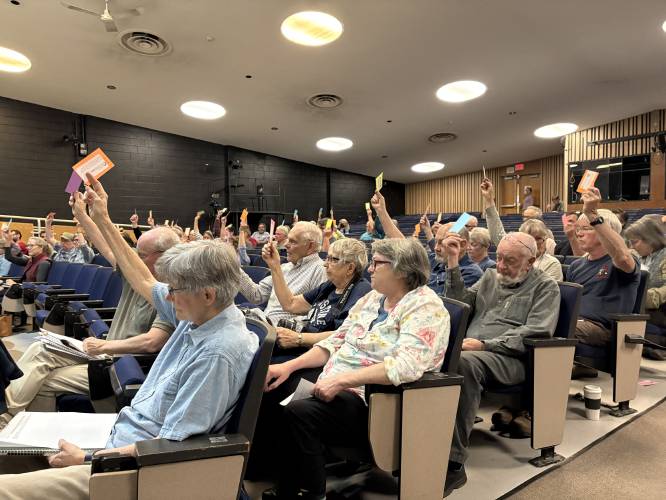





 Gov. Healey forms Anti-Hunger Task Force in response to federal SNAP cuts
Gov. Healey forms Anti-Hunger Task Force in response to federal SNAP cuts South County reporter bids adieu after four years
South County reporter bids adieu after four years
